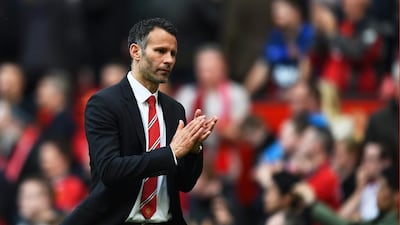MANCHESTER // Perhaps it is just as well for Ryan Giggs that this was not a job interview.
Manchester United were already intent on hiring a more experienced manager even before the Giggs bandwagon stalled a mere seven days after it started.
Sunderland are the side who have hit top gear and at a time when many expected them to reverse into the Championship.
A historic occasion has immediate consequences. Sunderland took themselves to the brink of Premier League survival by recording a first win at Old Trafford since 1968, meaning United have lost seven home league games in a season for the first time since the relegation season of 1973/74.
For Sunderland, it is the greatest of great escapes, a renaissance that should serve as an inspiration for United next season.
Yet it served as an immediate rebuttal of the theory United’s problems began and ended with a manager. David Moyes has been sacked and this was a Moyes-esque performance, but it highlighted the scale of their decline.
Restoring United to their old selves is not accomplished simply by removing Moyes. There was none of the pace, the urgency, the intensity and, above all, the creativity. United had possession without penetration. They were aimless. “We were flat,” Giggs said.
In contrast, Sunderland played with purpose. They have rediscovered their resolve when it mattered most.
When an eight-game run produced a solitary point, the second tier beckoned. Since then, they have claimed 10 from four. Most significantly, away matches at the Etihad Stadium, Stamford Bridge and Old Trafford have yielded seven points.
"Three easy games," Sunderland manager Gus Poyet said, smiling. It is a spectacular, sensational revival. "What we have done in the last four games is unique, incredible. You need to expect the unexpected with us."
Given their goal difference, they will be mathematically safe if Norwich City lose to Chelsea today. They can prepare for the Premier League, perhaps without the man who kept them there.
Sebastian Larsson is out of contract in the summer and likely to leave. His parting gift, a winner at Old Trafford, could be worth £60 million (Dh371m).
It was another addition to the list of all-too-avoidable goals United have conceded this season. Connor Wickham, seemingly penned in by the corner flag, was allowed to escape and cross. Larsson ran unchecked into the penalty area to dispatch a low shot past David de Gea.
Sunderland’s spirited breaks almost brought a second. They were denied by the woodwork twice. When one substitute, Jozy Altidore, centred, another, Emanuele Giaccherini, struck the post. Then Fabio Borini’s fierce effort rebounded back off the bar.
United were less potent. Javier Hernandez, granted a rare start, spurned two openings. Robin van Persie, out since March with a knee injury, returned as a substitute, but squad players such as Nani and Ashley Young illustrated why Louis van Gaal, United's probable next manager, is likely to mark his arrival with a spending spree.
“I still believe there is quality,” Giggs said. There was precious little evidence of it.
“In past seasons, there would be waves and waves of shots and saves and you could always sense a goal was coming, but this season it doesn’t seem to have happened,” the interim manager said. It was the story of a season.
Defeat may reap a dividend if it spares United Europa League football and enables them to concentrate on returning to the top four next season. Yet it is another indication of how far United have fallen that a lame loss has such compensations.
Sunderland’s reward of safety seems more tangible. “It would be crazy to lose this opportunity,” Poyet said.
As both teams can testify, it has been a crazy season.
sports@thenational.ae
Follow us on Twitter at @SprtNationalUAE


